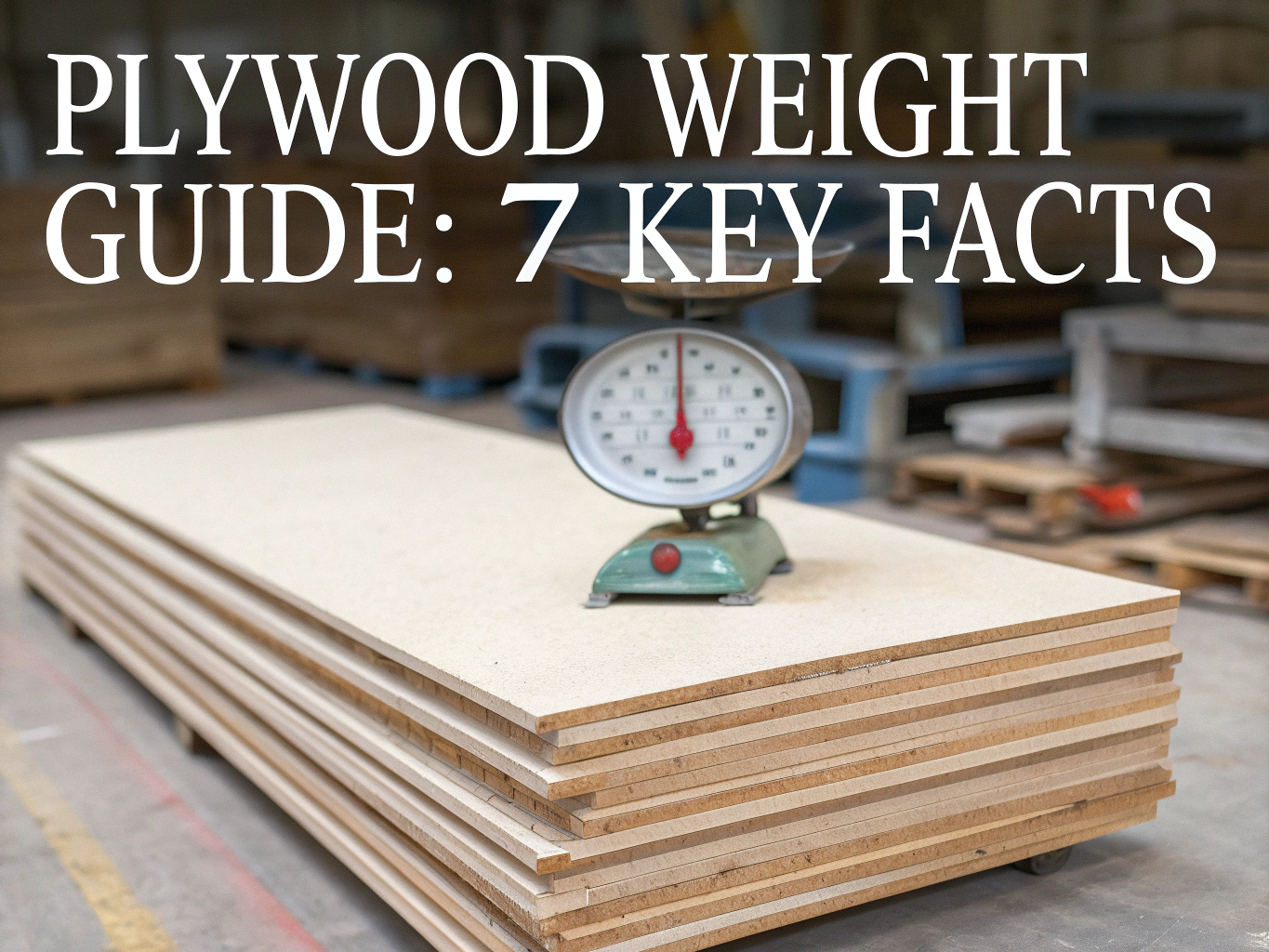
Understand Plywood Weight: 7 Key Facts You Need to Know

Have you ever wondered why plywood weight can vary so much? Even within the same thickness, different plywoods can feel surprisingly different in your hands. Understanding these differences is key when planning your project. Let’s explore what affects plywood weight and why it matters.
Table of Contents
Plywood weight varies significantly based on thickness, wood species, and construction type, with standard 4′ x 8′ sheets ranging from 22 pounds for 1/4″ softwood to 75 pounds for 3/4″ marine plywood. Understanding plywood weight specifications helps you plan projects, calculate transportation needs, and determine handling requirements for different applications.
Standard Plywood Weights by Thickness and Type
Common 4′ x 8′ Sheet Weights
The most common plywood sheet size measures 4′ x 8′, and weight varies dramatically depending on thickness and wood type. Here’s what you can expect for different thicknesses:
- 1/4″ (6mm) plywood: Softwood weighs 22 lbs, hardwood 24.5 lbs, marine plywood 27 lbs, and Baltic birch 26 lbs
- 1/2″ (12mm) plywood: Softwood weighs 40.5 lbs, hardwood 45 lbs, marine plywood 50 lbs, and Baltic birch 48 lbs
- 3/4″ (18mm) plywood: Softwood weighs 61 lbs, hardwood 67.5 lbs, marine plywood 75 lbs, and Baltic birch 71.5 lbs
Manufacturing variances and moisture content can cause actual weights to fluctuate by several pounds. Moisture content affects weight more than most people realize, with freshly manufactured sheets often weighing more than seasoned ones.
Metric Plywood Dimensions (1220mm x 2440mm)
For metric plywood sheets commonly used outside the US, standard weights follow these patterns:
- 6mm sheets: 9.98–12.25 kg (22–27 lbs)
- 12mm sheets: 18–22 kg (40–48 lbs)
- 18mm sheets: 27–34 kg (59–75 lbs)
Understanding 3/4″ Plywood Weight Specifications
Weight Range for 3/4″ Plywood
Plywood 3/4 weight specifications are among the most searched, and for good reason. This thickness offers excellent structural properties while remaining manageable for many projects:
- Softwood plywood: 61 lbs per 4′ x 8′ sheet
- Hardwood plywood: 67.5 lbs per sheet
- Marine plywood: 75 lbs per sheet
- Baltic birch plywood: 71.5 lbs per sheet
According to Inch Calculator, these weights represent industry standards, though individual manufacturers may vary slightly. Different plywood grades can also affect final weight.
Why 3/4″ Weight Matters
The weight of 3/4″ plywood affects both project planning and safety considerations. Most people can handle sheets up to 50 pounds alone, but heavier sheets require assistance or mechanical aids.
Common applications include furniture construction, shelving, and subflooring where structural strength is needed. The weight directly correlates with the material’s density and load-bearing capacity.
Key Factors That Affect Plywood Weight
Primary Weight Determinants
Several factors influence plywood weight beyond simple thickness measurements. Wood species creates the most significant variation, with hardwoods consistently weighing more than softwoods of identical dimensions.
Core structure variations also matter significantly. Solid core plywood weighs more than sheets with voids or lighter core materials. Resin and glue types add weight, with waterproof adhesives typically heavier than standard formulations.
Moisture content can add 10-15% to the base weight of freshly manufactured sheets. Seasoned plywood weighs less than green material, making storage conditions important for accurate weight calculations.
Special Plywood Types
Marine plywood uses waterproof adhesives and dense wood species, making it the heaviest option at 75 pounds for a 3/4″ sheet. Fire-resistant panels include chemical treatments that increase weight beyond standard specifications.
Engineered plywood variations like luan plywood offer lighter alternatives for specific applications. These specialty products balance weight with performance characteristics.
Ply Count and Its Relationship to Weight
Standard Ply Counts by Thickness
Ply count directly affects both weight and structural performance. More plies mean more glue layers and typically increased weight:
- 1/4″ plywood: Contains 3–5 plies
- 1/2″ plywood: Contains 5–7 plies
- 3/4″ plywood: Contains 7–9 plies
How More Plies Affect Weight and Performance
Higher ply counts increase weight but provide better dimensional stability and strength. According to ProWood, each additional ply layer adds approximately 2-4 pounds to a standard 4′ x 8′ sheet.
The trade-off between weight and performance makes ply selection project-specific. Structural applications benefit from higher ply counts despite increased weight.
Load-Bearing Capacity vs. Plywood Weight
Weight vs. Strength Relationship
Plywood weight correlates with load-bearing capacity, but the relationship isn’t linear. Load capacity varies by thickness and support conditions:
- 1/4″ plywood: Supports 5–15 lbs per square foot
- 3/8″ plywood: Supports 20–25 lbs per square foot
- 1/2″ plywood: Supports 25–40 lbs per square foot
- 3/4″ plywood: Supports up to 79 lbs per square foot for short spans
Real-world capacity depends on edge support and span length. Unsupported spans dramatically reduce load capacity regardless of plywood weight.
Load Calculation Formula
Calculate maximum load capacity using this formula: Load Capacity (lbs) = Width (ft) × Length (ft) × Max Pressure (psf). For a 4′ x 8′ x 3/4″ panel with 79 psf maximum pressure, theoretical capacity reaches 2,528 lbs.
Safety factors and real-world conditions typically reduce this by 50-75%. Professional applications should include appropriate safety margins based on Vina Wood’s load capacity guidelines.
Special-Purpose Plywood Weight Considerations
Popular Specialty Plywood Types
Marine plywood’s waterproof construction makes it the heaviest option, while Baltic birch offers an excellent strength-to-weight ratio. Craft plywood provides lighter alternatives for hobby applications.
Different cabinet plywood grades offer varying weights based on veneer quality and core construction. Premium grades often weigh more due to denser materials and better adhesives.
Project-Specific Applications
Heavy plywood sheets require proper handling techniques and equipment. Two-person lifting becomes necessary for most 3/4″ sheets, while lighter alternatives work better for overhead installations.
Compact plywood options provide excellent solutions for detailed work. These lightweight alternatives include:

3mm Baltic Birch Craft Plywood
- Includes 1/8 x 12 x 12 inch sheets
- B/BB grade for top quality
- Perfect for laser and CNC cutting
- Ideal for wood burning projects
- Strong alternative to basswood

Craft-Ready Baltic Birch Sheets
- Pack of six 3mm sheets
- B/BB veneer for superior quality
- Perfect for DIY and laser cutting
- Great for painting and engraving
- Durable and versatile material

8x12 Baltic Birch Craft Wood
- Includes two 12 mm thick boards
- B/BB grade offers quality finish
- Ideal for laser and CNC projects
- Stronger than balsa wood
- Suitable for making shelves
How to Determine and Specify Plywood Weight for Your Project
Finding Accurate Weight Information
Manufacturer technical sheets provide the most accurate weight specifications for specific products. Direct weighing offers precise measurements but isn’t always practical for project planning.
Weight estimation using published charts works well for preliminary planning. Chanta Wood’s weight reference provides comprehensive data for different plywood types and thicknesses.
Common Questions and Practical Considerations
Transportation requirements depend on vehicle capacity and handling equipment. Single-person handling limits typically max out around 50 pounds for safety reasons.
Project planning should account for weight in structural calculations and installation logistics. Overhead installations require lighter materials or additional support during construction.
Specialty Applications and Custom Solutions
Designer furniture projects benefit from weight optimization using thinner sheets or sande plywood alternatives. Custom applications often require balancing weight against performance requirements.
Gym equipment applications need materials that can handle heavy loads while remaining manageable during construction. Birch plywood offers excellent strength characteristics for storage solutions: Compact wood storage solutions combine durability with reasonable weight.

Compact Wood Dumbbell Rack
- Holds up to 200 lbs of weights
- Space-saving A-frame design
- Durable birch plywood construction
- Ideal for home gyms
- Perfect for organizing dumbbells
FAQs
How Much Does A Sheet Of Plywood Weigh?
The weight of a sheet of plywood varies based on its thickness and type of wood used. Generally, a standard 4×8-foot sheet of plywood can weigh anywhere from 25 to 85 pounds. Thicker sheets weigh more, while different wood species used in construction can also affect the weight.
Is Plywood Lighter Than MDF?
Plywood is typically lighter than Medium-Density Fiberboard (MDF) due to its layered construction and use of lighter wood species. However, the exact weight difference can vary depending on thickness and wood type.
What Factors Affect The Weight Of Plywood?
Several factors affect the weight of plywood, including its thickness, wood species, moisture content, and the type of plywood (e.g., softwood vs. hardwood plywood). These variables combine to determine the overall weight.
How Do You Calculate The Weight Of Plywood?
To calculate the weight of plywood, you need to know its density (varies by wood type), thickness, and volume. A common formula is: Weight (lbs) = Volume (cubic feet) x Density (lbs/cubic foot). Find the volume by multiplying the sheet’s dimensions (length x width x thickness in feet) and use the appropriate density for the wood type.
Does The Thickness Of Plywood Change Its Weight?
Yes, the thickness of plywood significantly impacts its weight. Thicker plywood has more material and thus weighs more than thinner versions. This can also affect its strength and durability.












